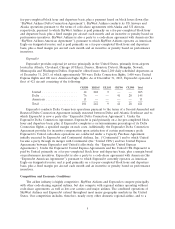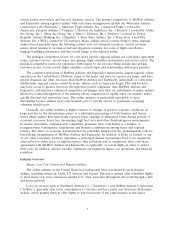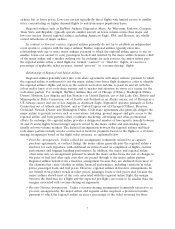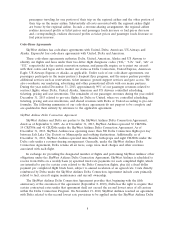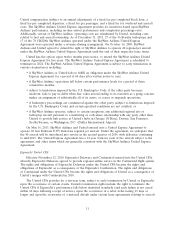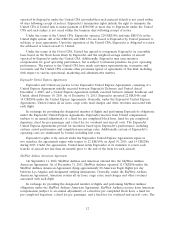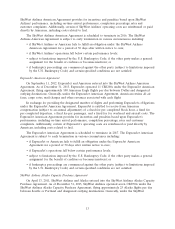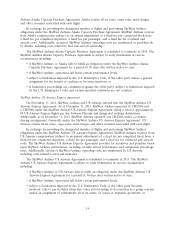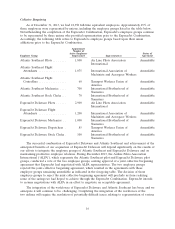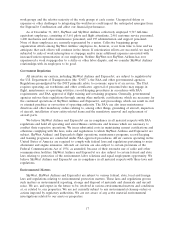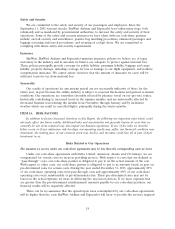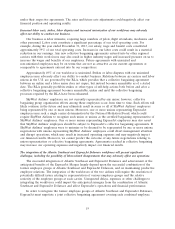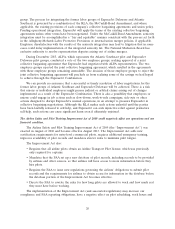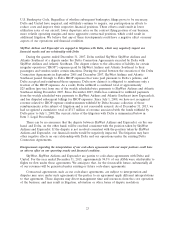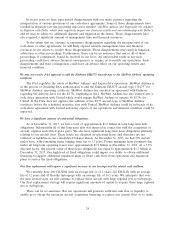SkyWest Airlines 2013 Annual Report Download - page 20
Download and view the complete annual report
Please find page 20 of the 2013 SkyWest Airlines annual report below. You can navigate through the pages in the report by either clicking on the pages listed below, or by using the keyword search tool below to find specific information within the annual report.•if bankruptcy proceedings are commenced against the other party (subject to limitations imposed
by the U.S. Bankruptcy Code) and certain specified conditions are not satisfied.
Training and Aircraft Maintenance
SkyWest Airlines and ExpressJet employees perform substantially all routine airframe and engine
maintenance and periodic inspection of equipment at their respective maintenance facilities, and
provide substantially all training to SkyWest Airlines and ExpressJet crew members and maintenance
personnel at their respective training facilities. SkyWest Airlines and ExpressJet also contract with
third-party vendors for non-routine airframe and engine maintenance.
Fuel
Historically, we have not experienced problems with the availability of fuel, and believe we will be
able to obtain fuel in quantities sufficient to meet our existing and anticipated future requirements at
competitive prices. Standard industry contracts generally do not provide protection against fuel price
increases, nor do they ensure availability of supply; however, our code-share agreements with Delta,
United, American, Alaska and US Airways provide for fuel used in the performance of the code-share
agreements to be reimbursed by our major partners, thereby reducing our exposure to fuel price
fluctuations. During the year ended December 31, 2013, United purchased the majority of the fuel for
our United aircraft under contract directly from its fuel vendors; and Delta purchased the majority of
the fuel for our Delta aircraft under contract directly from its fuel vendors. A substantial increase in
the price of jet fuel, to the extent our fuel costs are not reimbursed, or the lack of adequate fuel
supplies in the future, could have a material adverse effect on our business, financial condition, results
of operations or liquidity.
Employee Matters
Railway Labor Act
Our relations with labor unions in the U.S. are governed by the Railway Labor Act (the ‘‘RLA’’).
Under the RLA, a labor union seeking to represent an unrepresented craft or class of employees is
required to file with the National Mediation Board (the ‘‘NMB’’) an application alleging a
representation dispute, along with authorization cards signed by at least 35% of the employees in that
craft or class. The NMB then investigates the dispute and, if it finds the labor union has obtained a
sufficient number of authorization cards, conducts an election to determine whether to certify the labor
union as the collective bargaining representative of that craft or class. Under the NMB’s usual rules, a
labor union will be certified as the representative of the employees in a craft or class only if more than
50% of those employees vote for union representation. A certified labor union then enters into
negotiations toward a collective bargaining agreement with the employer.
Under the RLA, a collective bargaining agreement between an airline and a labor union does not
expire, but instead becomes amendable as of a stated date. Either party may request that the NMB
appoint a federal mediator to participate in the negotiations for a new or amended agreement. If no
agreement is reached in mediation, the NMB may determine, at any time, that an impasse exists and
offer binding arbitration. If either party rejects binding arbitration, a 30-day ‘‘cooling off’’ period
begins. At the end of this 30-day period, the parties may engage in ‘‘self help,’’ unless the U.S.
President appoints a Presidential Emergency Board (‘‘PEB’’) to investigate and report on the dispute.
The appointment of a PEB maintains the ‘‘status quo’’ for an additional 60 days. If the parties do not
reach agreement during this period, the parties may then engage in ‘‘self help.’’ ‘‘Self help’’ includes,
among other things, a strike by the union or the imposition of proposed changes to the collective
bargaining agreement by the airline. The U.S. Congress and the President have the authority to prevent
‘‘self help’’ by enacting legislation that, among other things, imposes a settlement on the parties.
15


